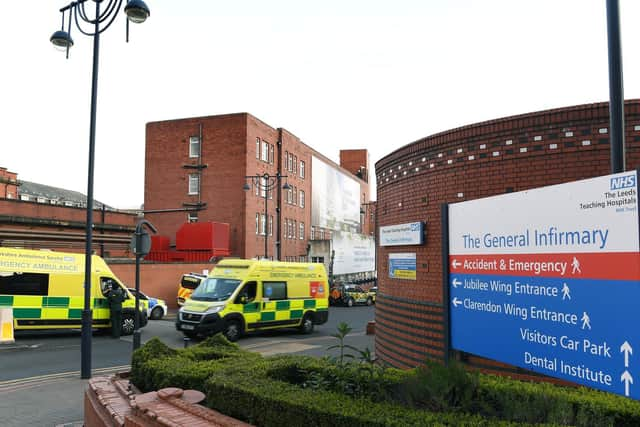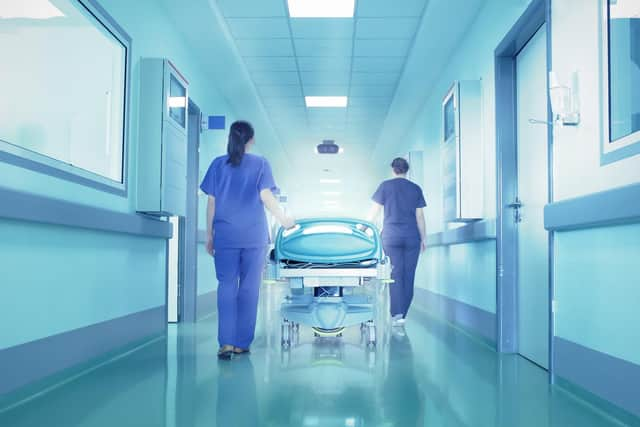'The long shadow of Covid-19' - new figures show impact pandemic has had on Leeds hospital services
and live on Freeview channel 276
Documents published by Leeds Teaching Hospitals Trust (LTHT) showed that in July, just 69.1 per cent of patients referred by their GP with possible cancer symptoms had been seen for their first outpatient appointment within 14 days - well below the 93 per cent NHS target and the lowest reported since at least 2016.
The Trust’s Integrated Quality and Performance Report, set to be discussed at a board meeting this Thursday, reported breast cancer clinics had been particularly hard hit, accounting for over half, 54 per cent, of the 868 breaches in July.
Advertisement
Hide AdAdvertisement
Hide AdIt said: “The impact of social distancing guidelines within the breast outpatient clinics has severely restricted capacity and resulted in high numbers of breaches. However the service is working to address this and provide additional capacity.”


Large numbers of breaches were also reportedly seen in colorectal and gynaecology.
The report said that in response to Covid-19, new referrals were being clinically triaged and if not assessed as urgent, were placed on hold.
At the end of May 2020, the number of cancer referrals on hold was over 1,600 but these had been cleared completely by June and July.
Advertisement
Hide AdAdvertisement
Hide AdThe report stated: “The consequence of this is that significant volumes of patients who had already waited beyond 14 days continue to be seen during August and September.”


It added: “As backlog clearance continues, performance is expected to reduce again in August 2020.”
At the height of the pandemic, the number of patients also left waiting over 62 days for their first cancer treatment - another NHS standard - had risen to 553 but the report said this had reduced to 282 at the end of August.
It said, of the situation in July: “Theatres are currently operating at 65 per cent capacity when compared to 2019. This capacity is being used to treat patients with cancer and who are clinically urgent, some of whom are on the 62-day cancer pathway, and some are on the 31-day first or subsequent treatment pathways.
Advertisement
Hide AdAdvertisement
Hide Ad“Improvement work within theatres is increasing the numbers of patients being operated on and additional capacity is also being brought online.”
The Yorkshire Evening Post understands the situation has since improved, with theatres currently operating at 85 per cent capacity, and there are plans to boost this figure further from October.
The latest analysis comes as the YEP is shining a light on statistics, bringing you the numbers from behind the scenes as part of our Your Right To Know campaign.
The Trust also reported a significant backlog in routine diagnostic testing - for which patients should wait no more than six weeks, according to NHS standards - after tests were suspended for 12 weeks, from March 23 to June 22 due to Covid-19.
Advertisement
Hide AdAdvertisement
Hide AdThe report says this left a peak backlog of 27,096 referrals but this had reduced to 13,479 by the end of August.
It says: “It is expected that performance will remain challenging throughout 2020/21 as we continue to operate at reduced activity levels.”
In his report to the board, chief executive Julian Hartley said: “The long shadow of Covid-19 continues to cast over us, but the response remains proactive and creative.”
He praised the “dedication and hard work” of staff across the Trust in changing the way they work and recover services over the summer months.
Advertisement
Hide AdAdvertisement
Hide AdBut he added: “The rates of positive Covid-19 tests across the city have risen significantly over recent weeks, and Leeds has been on the national watchlist of high case rates.
“This has now been reflected in increased Covid-19 related admissions to the Trust and increased pressure on our hospitals.”
At the end of July, LTHT, along with hospital trusts across the country, was told by health chiefs to enter ‘Phase Three’ of the Covid-19 response, which involves continuing the Trust’s recovery while also “planning for winter and a potential second surge of the virus”.
Board papers show the Trust has set up a number of task forces - or ‘tactical working groups’ - to tackle issues in preparation for the expected winter and Covid-19 pressures.
Advertisement
Hide AdAdvertisement
Hide AdThe Trust plans to treat patients in order of clinical priority - with emergency operations needed within 24 hours at the forefront, followed by urgent operations needed within 72 hours, then surgery that can be deferred for up to four weeks and finally treating the longest-waiting patients in chronological order.
It also plans to increase senior clinical decision-makers and beds, reduce length of stays and enhance its out of hours service.
A Trust-wide initiative is also being launched to shift patient discharge to earlier in the day.
However, the winter plan acknowledges that there are “a number of unknowns” in relation to Covid-19 - such as immunity duration and resurgence pattern as well as national or local lockdowns - and said challenges remain in capacity for some services due to social distancing and limited waiting areas.
Advertisement
Hide AdAdvertisement
Hide AdIt added: “In addition, PPE requirements, additional cleaning measures and downtime required between aerosol general procedures have significantly impacted on the efficiency of some of our services.”
Despite the added pressures due to Covid-19, the Trust's health bosses are keen to stress that the hospitals' emergency services are still open and able to help those in need, in a safe environment.
Chief medical officer Dr Phil Wood said “It's always important to get emergency medical help when you need it.
"People who have existing conditions and need to access health services, or those that develop symptoms that aren't Covid-19 related should still attend.
Advertisement
Hide AdAdvertisement
Hide Ad"Emergency health services are still there for those who need them and people should not ignore potentially serious symptoms.
"Anyone with cancer symptoms should speak with their GP who will refer patients to us where appropriate.
"Patients are being treated in a safe environment and we have a range of measures in place.”
A message from the Editor: Leeds has a fantastic story to tell - and the Yorkshire Evening Post has been rooted firmly at the heart of telling the stories of our city since 1890. We believe in ourselves and hope you believe in us too. We need your support to help ensure we can continue to be at the heart of life in Leeds.
Advertisement
Hide AdAdvertisement
Hide AdSubscribe to our website and enjoy unlimited access to local news and information online and on our app. With a digital subscription, you can read more than 5 articles, see fewer ads, enjoy faster load times, and get access to exclusive newsletters and content. Click here to subscribe. For more details on our newspaper subscription offers click here.
Thank you
Laura Collins
Comment Guidelines
National World encourages reader discussion on our stories. User feedback, insights and back-and-forth exchanges add a rich layer of context to reporting. Please review our Community Guidelines before commenting.